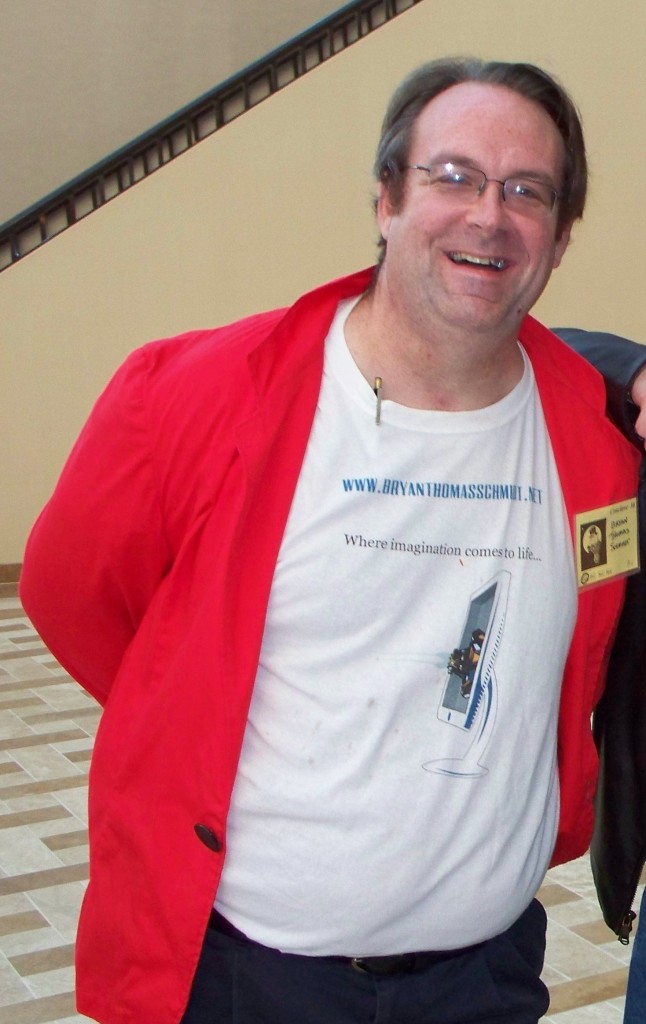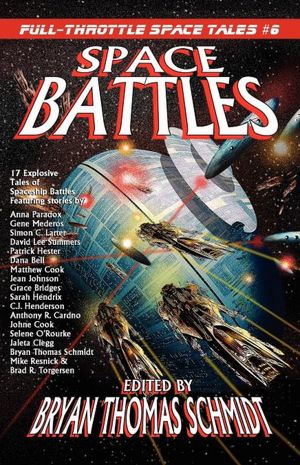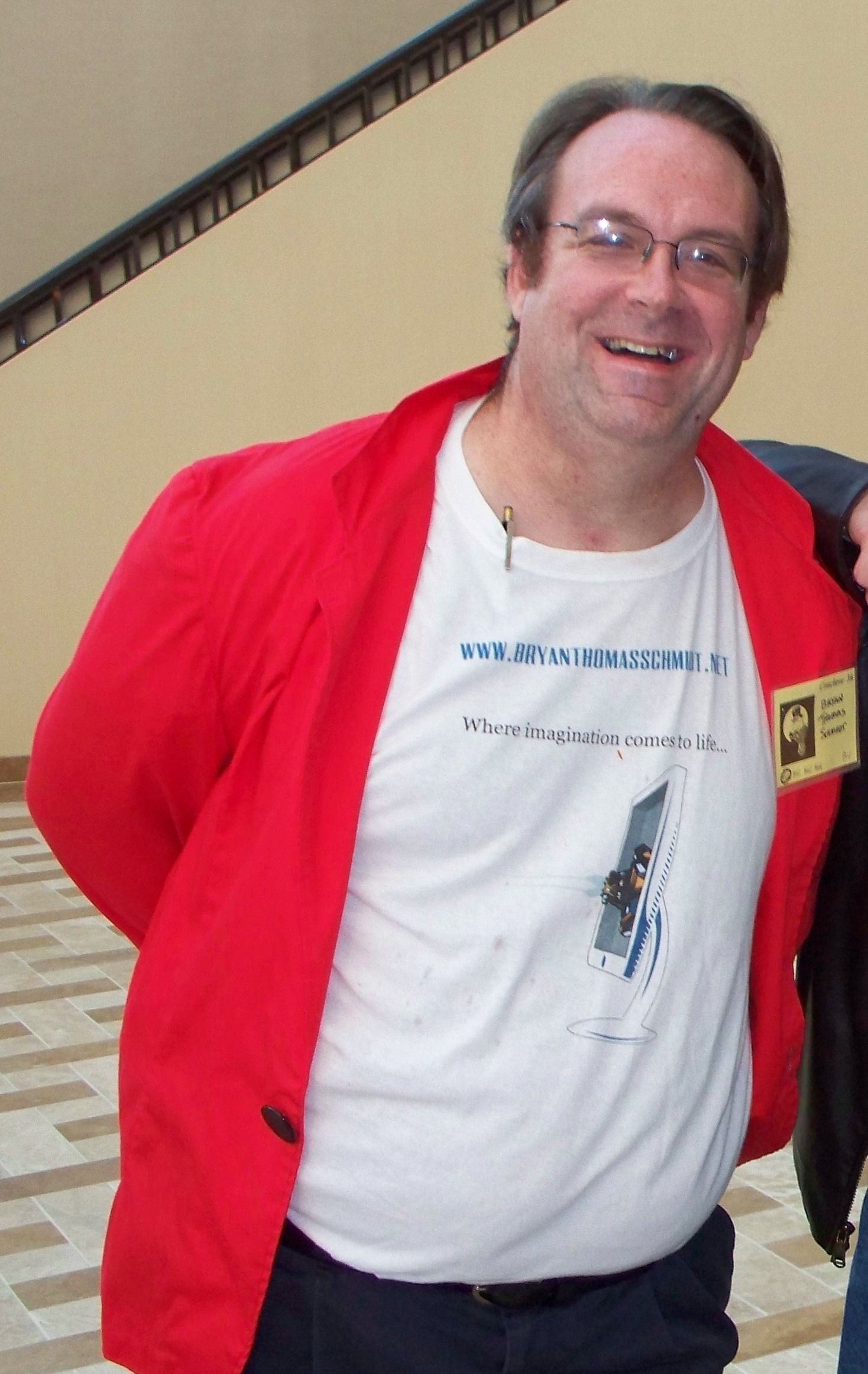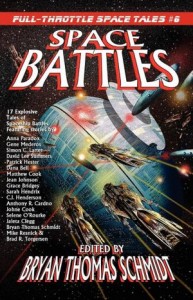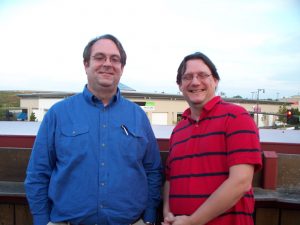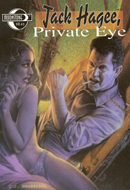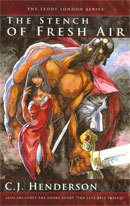Well, since it’s International Fiction Day, and it’s also about a year since my first short story was published in an anthology, I thought I’d share something fictional with you. This is my first sold fantasy short story. It’s written like a modern fairy tale and focuses around a dragon’s friendship with a young girl. The story was inspired by an open call for submissions of stories about dragons, cats, or both. My friend Dana Bell edited the anthology and it also features Andre Norton and many other talented writers and poets. So I hope you enjoy this tale. It’s named after my dog, Amelie, yes. And Glendon is from my mom’s name, Glenda. And Ramon is my father’s name. Just a little trivia. I have fun tuckerizing. Anyway, I hope you enjoy:
Amelie’s Guardian
by Bryan Thomas Schmidt
© copyright 2011 by Bryan Thomas Schmidt. All Rights Reserved. Duplication without permission except under fair use prohibited.
Published April 2011 in “Of Fur And Fire,” an anthology from DreamZion Publications, Denver, CO.
| L |
ong ago in a land known as Glendon, there lived a young girl, whose name was Amélie. Her mother was a seamstress and her father was a soldier, a Captain in the Kingdom Guard, who’d been seven moons at war. They lived in a small village on the banks of the mighty River Rhi, surrounded by woods. They led a quiet life of farming and simple trades, far from the capitol.
Her mother’s name was Mara, and her father’s name was Ramon. Mara and Amélie had huddled together as Ramon and his men rode out one fate-ful day, straight down the main street, amidst the straw roofed cottages. Their horses whinnied with excitement as the villagers felt the vibration of their pounding hooves, and choking clouds of dust rose up, carried on the Autumn breeze.
Amélie buried her face in her mother’s well-worn apron, her shoulder rising and falling to the rhythm of her sobs. Her mother kept a brave face, but Amélie knew she was worried, too. Late at night, as she lay restless, Amélie heard her mother’s own sobs through the thin walls of their cottage.
The village itself, Tallerive, had not known conflict in many years and the surrounding woods were known to be safe and quiet. To keep her daughter occupied and avoid her sitting around worrying, Mara sent Amélie out each morning on a daily quest. One day might be to gather berries in the near-by woods, another to pick up freshly fallen apples. Amélie delivered eggs to the inn and gathered cloth from the weaver’s. All the while Mara stayed home to feed the chickens, work on her sewing, and kept the cottage clean.
On one of these quests I met Amélie. I’d been watching her for a long while and found her intriguing. Her blonde curls bounced as she walked which was a kind of rhythmic loping with a bounce in her steps. Her demeanor was one of curiosity and playfulness, yet I detected a sadness beneath it, echoed in her brown eyes. It touched me. She looked lonely, and that was something I understood well.
For years, I had occupied a mountain-top near the village, but because I nev-er bothered the village, the humans never came to trouble me. I rarely ap-proached humans because of their reaction. Adult humans would scream and hurl rocks or spears when I got too close.
But Amélie was a wee child, and ex-cept for worry about her father, she seemed quite fearless. My heart ached for her on the times I glimpsed her sobbing beneath the apple trees. Other times she talked or sang to herself as she gathered the fruit. Her lilting voice was a delight to my ears.
I chose to meet her one day atop a hill beside the apple trees. I went early, for Amélie always came mid-morning, and I wanted time to prepare so I could present myself well. I heard her singing first as she approached. The gentle wind seemed to amplify it somehow through the woods. I could make out every syllable long before I heard her feet rustling in the fallen leaves and brush.
In a few moments, she bounced into view. I saw her golden locks first, then her silky white skin and red cheeks. She began gathering the apples lying at the base of the trees. She seemed in better spirits than I’d seen her previously.
As she worked her way through the trees, I considered again how best to make my presence known. My kind are not known for their subtlety, of course, but at the same time, startling her didn’t seem wise. So, as she continued singing and gathering, I decided to join her song. I’d heard her repeat the refrain several times already, so I waited until she finished the verse she was on, cleared my throat as softly as I could, and joined her on the refrain.
My voice, I’ll admit, was rough from disuse. I lived alone atop a mountain, after all. Nonetheless, it wasn’t the to-tal disaster I’d feared. It took a few moments for her to realize she was no longer singing alone. As soon as she did, she stopped and whirled around, her eyes searching, until finally they found their way to the top of the hill.
Finishing the refrain’s last line alone, I curved my lips into smile, taking care not show my sharp teeth lest I frighten her. I didn’t speak, wanting to be sure I said the right thing. I feared she would run away, but her eyes never showed the fear which was most hu-man’s normal reaction. Instead, her head tilted slightly as her eyes took me in, and she set down her basket, She stepped closer to get a better view.
“You’re a dragon, aren’t you?”
I nodded, the smile frozen on my long narrow snout.
“Are you going to eat me?”
I shook my large head. “No.”
“In my uncle’s stories, dragons either eat you or burn you,” Amélie said, her face twisting in a quizzical way as she thought. “You don’t look so scary to me.”
I laughed, relieved. I couldn’t help my-self, but the sheer volume made her step back toward the woods, looking as if she might run. “No, I won’t eat you, I promise. I came here to meet you.”
“Meet me?” She stepped forward again, clearly intrigued. “Why?”
“I’ve been watching you for some time now. You’re quite fascinating.”
She shook her head, an amused smile crossing her face. “I’m just a little girl.”
“Yes, and I’m just an old dragon, but still, I find you interesting.”
Amélie laughed, a charming high pitched sound which warmed my heart. The sound was filled with joy and a sense of freedom I longed to know, as if she had not a care in the world. Oh to know such freedom! I was rapt with fascination.
“What’s your name?” Amélie started slowly climbing the grassy hillside toward me.
“My name is hard to translate into human,” I told her, trying to come up with something she could understand. “You can call me whatever you’d like,” I finally said.
She smiled as she stopped beside me, then moved slowly around, examining me without fear. “You’re very green, you know. And very big, too.” She crinkled her nose. “You smell funny, too.”
“I smell like all dragons, I suppose.” I tried not to be offended, reminding myself she meant no harm. Besides, she smelled odd to me, too.
“Perhaps I should name you some-thing grand.” She put a finger on her mouth thinking.
I smiled, liking the sound of it. I was-n’t familiar with human names, but I hoped it was grand. “I like that.”
Amélie giggled. Her face took on a serious look. “I think I shall name you Johannes. Okay? ”
“Johannes?” I thought it over, trying it on for size. It did sound somewhat re-gal to me, very formal and proper it seemed. “Okay, Johannes it is.”
She nodded with approval and smiled again. “My name is Amélie. I’m from Tallerive. Do you know it?”
I nodded and smiled back. “Indeed. I live atop the Mount to the East.”
“Shadow Mount?”
So that’s what the humans called it! As I considered the meaning I remem-bered it did cast shadows over their village in late morning, before the sun rose to its afternoon peak and started its descent. “Shadow Mount, yes.” I nodded.
“Is it scary? Father and Mother told me stories of large creatures and people who disappeared there long ago.” She shuddered at the memory of them.
My mind raced to find words I could tell her which wouldn’t make her fear me. Dangerous creatures dwelled there—direwolves and bats and trolls—and the few human adventurers who’d tried to climb it usually died at the hands of one or the other. Only one had made it to the top and confronted me but that had been long in the past. I’d meant to spare him but he came at me with a sword, and I’d had to defend myself. The stench of burning flesh haunted my memory causing me to cringe. I’d always tried to live in peace with the world around me. It gave me no pleasure watching him die.
“It’s been my home for many gener-ations,” I explained. “It’s not scary to me, but there are creatures about who might do harm to someone like you.”
Her lower lip curled up over its com-panion a moment, then she shook her head and spread her legs in a defiant stance. “I’m not afraid. My daddy would protect me.” She paused, her eyes turning sad and looked at her feet. “If he were here.”
My heart melted at seeing her pain. I wanted to reach out and comfort her, but one of my hands was twice her size and I feared crushing her by accident, so I sat where I was.
“He’s gone to war,” she told me, not knowing I already knew. Sadness dark-ened her face like a shadow. “But he’s coming back to visit soon. My Mother got a letter today.” At the mention of it, her smile returned and she did a little dance, sending her brown skirt fluttering around her long, skinny legs.
I laughed as I watched her. Such a delightful sight to behold. “You miss him a lot.”
She nodded, glancing back at her apples. “I have to go back soon. My Mother will worry. She’s waiting to make fresh apple pie.” Her tongue slid quickly across her lips at the mention of it .From her face I could see it was something delicious. “But I enjoyed meeting you, Johannes.”
“I enjoyed meeting you, too, Amélie.”
“Will I see you again?”
“I hope so,” I said as I watched her turn and bounce back down the hill the way she’d come. She went straight to her basket and picked it up, glanc-ing back at me with a smile before re-turning to her gathering.
We visited daily from then on. I land-ed in a glen near the berry bushes or a brook near the path to the weaver’s; somewhere close to wherever she was headed for the day. I made sure to avoid other villagers or their animals. Drawing too much attention would put an end to our visits, and Amélie appeared to enjoy them as much as I did. In fact, since we’d met, I hadn’t seen her sob in the woods once. It was as if somehow my companionship made her feel less alone. I know my time with her had that effect on me. Both of us enjoyed each other’s com-pany, the only difficulty being the times she begged me to take her for a flight.
“What’s it like to fly?”
“It’s freeing.” It was all I could think of.
“I wish I could fly.” She looked up toward the puffy white clouds with a dreamy look. “It must be wonderful.”
“It is until…” I stopped. Perhaps she was too young to know the dark truth of her people’s relations with my kind.
“Until what?” Her eyes held the sense of wonder common to all younglings. Wide and brown, they looked at me as if I were the core of wisdom. It was im-possible to resist them, as much as I tried.
“Sometimes people see me and they become afraid.” I watched her for a re-action. “They try and attack me.”
Her eyes watered and she ran toward me, wrapping her arms around my lower arm. It was so large her out-stretched arms could only stretch part way around. “Why would anyone want to hurt you? You’re so kind.”
I closed my eyes at the warmth of her body pressed against mine. She softly stroked my scales.
“Your scales are soft,” she said in won-der. “They look so hard.”
I smiled. “They’re my protection a-gainst enemies. They hold up very well when I need them, but they’re like my skin, Amélie.”
She smiled as she caressed them. “I like them.” She stepped back so our eyes met. “Take me flying with you, Johannes!”
Fearing she might fall, I politely re-fused her. “I’m sorry. I can’t.”
“I’ll be careful, I promise. Just a little flight. Not even very high. I want to know what it’s like.”
Each time I refused from then on, she had the same sad eyed expression she’d had whenever she spoke of her father. After several tries, she turned away and looked back down the hill to-ward her village. “Friends do things for each other,” she half accused.
My heart ached to fulfill her wish, but how would she hold on? I couldn’t risk it. I didn’t know what to say, and, after a few heartbeats, she simply started her bouncing lope down the hill, not looking back at me, as she usually did when we parted.
The next day, she returned to her old self, running to hug me when she saw me in the glen near the berries. She chased me as I hopped and skipped just out of reach, using my wings for short bursts of flight, making her laugh and laugh as she kept trying to out-smart me. In the end, I let her catch me, and the joy on her face gave me a happiness I had never known. My life as a dragon had been so lonely. Amélie was the first true friend I’d had since I was a youngling, and had other drag-ons as my companions. I thought of her like family, although I tried to guard my heart.
As the day approached for her father’s expected arrival, the energy radiating from Amélie grew more and more joyful. It felt as if all her cares had suddenly vanished. She spoke often of her father—how he used to tell her stories as he tucked her in at night, stories of knights and castles and princesses and battles. She knew her daddy was as brave as the men in those stories. She spoke of him as gentle and kind and wise and honorable. Hearing her describe him, I wished I could meet him, but then I remembered my previous encounters with human adults Which hadn’t turned out well.
It made me sad to only share a small part of her world. I’d grown quite fond of her and she of me. But Amélie her-self seemed to enjoy our secret friendship. It was something of her own she didn’t have to share with anyone, she said once. She called me her best friend, her guardian, making me promise I would look out for her until her father came home. I always promised when she said it, although I started worrying her father’s arrival might bring an end to our encounters.
Finally the week came for her father’s homecoming. I watched from the woods as she and her mother waited anxiously outside their cottage. Smoke rose from the chimney and I smelled the scent of fresh baked bread, a smell I always associated with the village.
Her mother kept busy sweeping and doing laundry, but Amélie sat patiently on a wooden bench, watching the road, her eyes anxious and excited. I sniffed the wind, searching for a scent of human sweat and approaching horses. For several daylight hours I kept vigil with her. But no one came.
Her mother’s face grew more and more concerned, her eyes darkening with worry as her face dropped into a frown. She went behind the house twice, wiping tears on her stained apron where Amélie couldn’t see her. And finally, as the sun arced overhead, preparing to start its descent in the west, she called Amélie to her, handed her a basket and motioned toward the woods.
I found her near the apple trees, land-ing on the hill where we’d first met. She paid me no attention, sniffling as she gathered apples, her shoulders drooping, her eyes fixed on the ground near her feet. I ached with all my heart to reach out and comfort her, but the trees kept me from drawing near, and it seemed obvious she wanted to be left alone.
As she returned to the village, the basket half-full, I made a decision and launched myself with a running start. I soared high amongst the clouds, following the road leading from the village, the route she’d told me her fa-ther would come. The wind caressed me as soared, a pleasant feeling I al-ways enjoyed. I flew what seemed like a long time, but, from the sun’s lack of movement, I could tell little had passed. I heard them before I saw them—the sharp clash of swords, the high screams of horses. I could smell their sweat and hear their shouting. I knew the sounds of battle and willed my wings to move more swiftly.
I found them at a crossroads, fighting face to face, dozens of companions dy-ing all around. Her father looked tired and older than I remembered him. I knew then their fighting had been long and terrible. He and one of his soldiers stood outnumbered by the en-emy, who had three archers on horse-back firing at them from a rise, while five others surrounded them with swords.
One of the enemies, who appeared to the leader, raised his arm and his men stopped waiting. “If you surrender now, your lives will be spared,” the leader shouted.
“If we surrender now, our lives are worthless,” Amélie’s father answered. “Honor and glory to the King!” He raised his sword and his companion did likewise.
The enemy soldiers laughed. “Your honor will be your end,” the enemy leader responded. He lowered his arm and his men moved in.
Swords clanged and men grunted. I could see Amélie’s father was ex-hausted and could barely lift his sword. His companion took a sword through the stomach and fell to his knees, his life’s blood watering the parched dirt.
They needed me! Swooping down from behind, I blasted the archers with fire from my mouth. They shrieked as their clothes caught fire and uselessly tried to escape into the woods. I con-tinued down toward the others. Spot-ting me, the enemy soldiers yelled and swung their swords over their heads in desperation, ducking as I flew past. I turned my head and blasted two of the enemies with flames. I then swung back up to circle around.
As I came in the second time, I saw some of the enemy mounting their horses. Apparently they’d done the damage they intended and had no desire to stick around and fight a dragon as well. Amélie’s father collapsed in a heap, as if his legs could no longer hold him. I dropped down and landed nearby. He turned his head toward me, his face showing resignation to whatever fate might bring.
“I have no strength left to fight you dragon,” he said. “I’m at your mercy.”
I looked him over, trying to decide what to do. Then I took a running start, reaching down to grab him with my talons I arched back up into the clouds, returning the way I’d come toward Tallerive where my sweet friend would be waiting. He relaxed in my grip, hanging there as if he’d fallen asleep, but I glanced down once and saw his eyes examining me.
As I flew, my mind raced, trying to decide how I could return him to Tallerive without raising alarms. If I left him in the woods, Amélie and her mother wouldn’t know to find him there. But if I took him to the village, the men might attack me on sight. In the end, I knew I had no choice, so I flew over the village once, before I came in for landing on the main road near his family’s cottage.
Two women removing clothes from a line screamed and ran as they saw me, calling for their husbands. I set Amélie’s father gently on the dirt and prepared to take off again as Amélie and her mother appeared in their doorway. Her mother’s face filled with fear as she saw me standing over her husband, but Amélie brightened, her face lighting up with a smile as she ran toward me. Her mother and father both called for her to stop, but she didn’t listen. She embraced her fallen father.
His arms wrapped around her. I heard men shouting as they came up the road. I had only moments before they’d arrive to engage me, so I smiled at Amélie as she hugged her father.
She looked up at me, tears streaming down her face. “Thank you, Johannes. I love you.”
I choked back my own tears as I nod-ded and ran up the road, launching myself into the air. I heard her father ask: “Who’s Johannes?” behind me as I disappeared over the trees into the woods, heading for my mountain home.
For the next week, I saw Amélie only from a distance. She did her usual chores, but I kept my distance for fear the adults might be nearby to protect her from me. It was always the same, in every town, with every race of hu-mans. Dragons were feared and hated—the enemy. No matter how she explained it, they’d never understand. I had to prepare myself for the loss of her companionship. I hoped I was wrong, but I had to be ready.
∞
“Johannes! Where are you?”
Her voice echoed through the trees and cut through my fears like a sword through flesh. I circled down in an arc toward the glen near the berries. It sounded like her voice had come from there and my nose detected the scent of humans. I peered through the trees trying to spot those golden locks, but with the first snowfall, the canopy was layered in white, covering the gaps in the trees.
Setting aside my worry, I swung down and landed in the glen near my usual spot. As I turned toward the now bare trees, Amélie came racing toward me, a thick shawl wrapped around her shoulders. Her curls bounced as bounded toward me and smiled with delight.
She swung her arms around my neck as she reached me, caressing my scales. “I missed you, Johannes!”
“I missed you, too.” And then I saw them. Her parents stepped out from behind the thick trunks to watch us cautiously.
Sensing my concern, Amélie stepped back to look me in the eye. “It’s all right. They came here to meet you. I told them all about us.” She patted my neck. “Don’t be afraid.”
As she waved at them, her parents approached with trepidation. “You save my life, dragon,” her father said as he drew near.
I nodded. “You family needs you.”
“We’re so grateful,” Amélie’s mother wiped moisture from her eyes.
“It is I who am grateful. For the friend-ship of your daughter.”
Her father smiled. “Dragons and humans are not known to be friends.”
“Johannes is a good dragon,” Amélie said. “He’s my guardian.” She smiled at us, as if dragons and humans should always have been friends
The adults and I laughed.
“We know that, dear.” Her mother tousled Amélie’s hair as she placed an arm around her shoulders.
“But he never let me fly with him.” Amélie frowned.
“It’s quite amazing,” her father teased.
“No fair!”
Her parents and I shared a laugh again. “I don’t want you to fall and my talons might crush you.”
“I have an idea about that,” her father said. “Meet us here tomorrow.”
The next day, they returned with a leather horse harness her father had modified. It fit Amélie securely and had a handle where I could clasp on with my talons and carry her safely.
Their confidence amazed me. “You would trust me with her life?”
“You proved trustworthy with mine.” Her father nodded as he finished helping Amélie into the harness. Lov-ingly, he snapped the last fitting and made sure her shawl was secure around her. “Everything is fine,” he reassured Mara, who stood nearby, looking slightly worried.
Amélie smiled, then hurried over beside me, waving. “Come on! I’m ready!”
“As you wish, little one.”
And with that I lifted off, hovering just above the ground as her father rushed in, ducked underneath and held the harness handle up so I could grasp it. My talons closed tightly around it and I tugged gently. It moved with me.
With a nod from her father and wave from her mother, I took off, carrying Amélie into the clouds. She laughed with delight, pointing at the village as she saw it beneath us. She pointed at the mountain I called home, at the river, and the hill where we’d met. I told her stories about all of them, recollections from the hundreds of years I’d lived here. When she drew quiet, I guessed perhaps she was overwhelmed. I flew in silence, letting her ponder at what she’d heard and seen.
I returned her safely after a daylight hour to where her parents waited in the glen. Our daily visits resumed after that, and although she occasionally brought her parents, mostly she came alone.
∞
Long ago in a land known as Glendon, there lived a girl, whose name was Amélie. Her mother was a seamstress and her father was a soldier, and her best friend was a dragon.
She came to see him every day, intro-ducing him to her husband before they married, and bringing her child-ren to play with him. As she grew, their relationship transitioned from mere companionship to a sort of mentoring.
The loneliness which had once haunt-ed the dragon was never known again. Even the villagers welcomed him with open arms, calling him “Amélie’s Guardian.” Their friendship became legendary. He became part of the family, and he protected the girl and her village for all of his days.
THE END
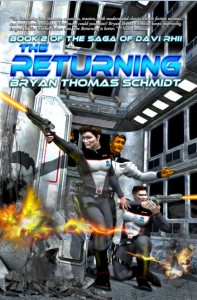 Bryan Thomas Schmidt is the author of the space opera novels The Worker Prince, a Barnes & Noble Book Clubs Year’s Best SF Releases of 2011 Honorable Mention, and The Returning, the collection The North Star Serial, Part 1, and has several short stories featured in anthologies and magazines. He edited the new anthology Space Battles: Full Throttle Space Tales #6 for Flying Pen Press, headlined by Mike Resnick. His children’s book 102 More Hilarious Dinosaur Jokes For Kids from Delabarre Publishing. As a freelance editor, he’s edited a novels and nonfiction. He’s also the host of Science Fiction and Fantasy Writer’s Chat every Wednesday at 9 pm EST on Twitter, where he interviews people like Mike Resnick, AC Crispin, Kevin J. Anderson and Kristine Kathryn Rusch. A frequent contributor to Adventures In SF Publishing, Grasping For The Wind and SFSignal, he can be found online as @BryanThomasS on Twitter or via his website. Bryan is an affiliate member of the SFWA.
Bryan Thomas Schmidt is the author of the space opera novels The Worker Prince, a Barnes & Noble Book Clubs Year’s Best SF Releases of 2011 Honorable Mention, and The Returning, the collection The North Star Serial, Part 1, and has several short stories featured in anthologies and magazines. He edited the new anthology Space Battles: Full Throttle Space Tales #6 for Flying Pen Press, headlined by Mike Resnick. His children’s book 102 More Hilarious Dinosaur Jokes For Kids from Delabarre Publishing. As a freelance editor, he’s edited a novels and nonfiction. He’s also the host of Science Fiction and Fantasy Writer’s Chat every Wednesday at 9 pm EST on Twitter, where he interviews people like Mike Resnick, AC Crispin, Kevin J. Anderson and Kristine Kathryn Rusch. A frequent contributor to Adventures In SF Publishing, Grasping For The Wind and SFSignal, he can be found online as @BryanThomasS on Twitter or via his website. Bryan is an affiliate member of the SFWA.




